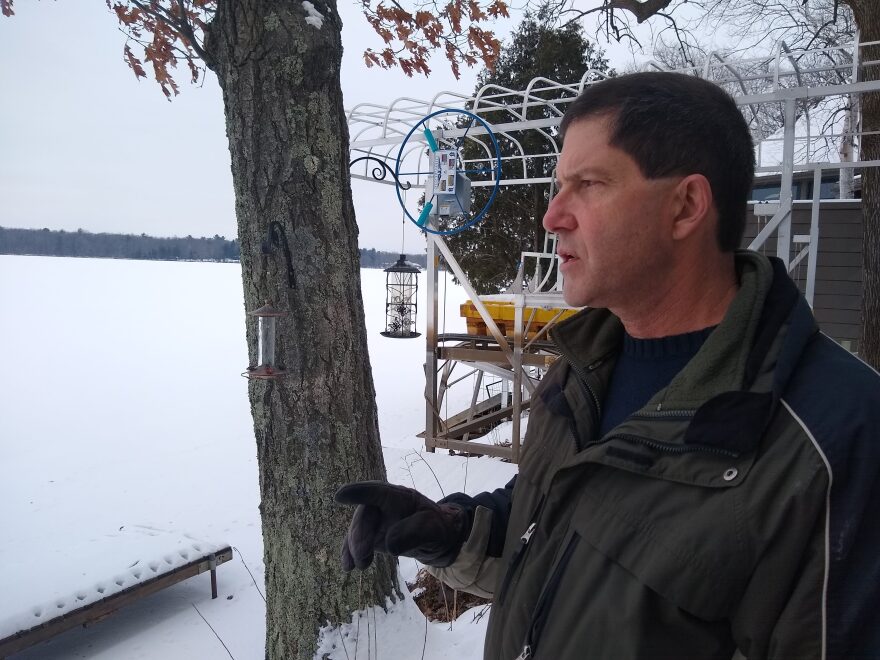The waters of the Biron Flowage are no more than ten feet from the porch of Mike Spranger’s second home.
“This is the reason we bought it,” he said. “The water is right there.”
The 1,500-square-foot house is just ten minutes from Spranger’s main residence in Wisconsin Rapids. He and his wife bought it in 2015, mainly as a refuge for their four grandchildren, who took to the water

immediately.
“I tied some floatation devices, like tubes and things like that, off from the end of the pier. They would run off the pier. It was an obstacle course for them. They’d jump off, swim up, back in. They did that for hours. Literally, until it was too dark to do it,” he remembered. “It’s been awesome.”
Spranger didn’t think twice about his right to put in a pier in front of the home. But now, the Wisconsin Supreme Court has thrown his right, and the right of all waterfront landowners on flowages, into question. It’s a complex legal issue involving energy companies, paper mills, and property rights. Now, Spranger has become a leading advocate for a movement called “Protect Our Piers.”

The Biron Flowage, the site of Spranger’s home, is created by a dam on the Wisconsin River a few miles downstream. The dam helps power the ND Paper Mill in Biron, and the flowage is one of more than 200 in Wisconsin Many, like this one, have a quirk in property law.

Under the state’s Public Trust Doctrine, no one owns the water. But private companies often own the flowage bed underneath the water.
It’s never really been a problem for homeowners on shore, said Tom Larson, the Senior Vice President of Legal and Public Affairs for the Wisconsin Realtors Association.
“For at least the last 140 years, the general rule was that if you owned waterfront property on water that was a public waterway, you were presumed to have riparian rights,” Larson said.
Those rights meant people could put in a pier, even if it touched a company’s property on the flowage bed. That pier right is the reason Spranger bought his property on the Biron Flowage, even though the Consolidated Water Power Company owns the land underneath.
But that precedent was thrown into question in 2018. The Wisconsin Supreme Court ruled a Price County landowner could stop his neighbor from putting in a pier because he owned the flowage bed underneath. Incidentally, the neighbor was his sister.

“I don’t know that [the Supreme Court] truly understood the gravity of the situation,” Larson said.
The ruling could affect all owners of property abutting Wisconsin’s hundreds of flowages. It seems to give flowage bed owners the ability to block waterfront property owners from putting in piers.
Larson and his allies hope to see a bill passed that would effectively reverse the Supreme Court decision and ensure pier rights.
The bill got a hearing in an Assembly committee last week, and support was far from unanimous.
Bill Skewes, the executive director of the Wisconsin Utilities Association, went even further.
“The enactment of the bill would be unconstitutional,” said Bill Skewes, the Executive Director of the Wisconsin Utilities Association. “The proposed legislation would violate the U.S. and Wisconsin constitutions via taking of property rights without just compensation.”

Opponents of the bill say it risks putting hydroelectric companies and paper mills out of compliance with their federal licensing.
“Maintaining our Federal Energy Regulatory Commission license for hydroelectric dams is critical to our overall operations,” said Scott Suder, the president of the Wisconsin Paper Council. “FERC requires members to adhere to strict guidelines and standards. Maintaining sufficient property rights is an essential part of this management.”
Skewes said utilities have always been good neighbors to waterfront property owners with respect to pier placement.
“We will continue to do so, regardless of the Supreme Court decision,” he said.
But at his house on the Biron Flowage, Spranger didn’t buy that commitment.

“That’s bulls***,” he said. “It’s all at the whim of the guy who’s in control.”
Spranger could foresee a situation in which the flowage bed owner, Consolidated Water Power, blocks him from putting in a pier, or maybe charges him a fee. He’s concerned enough about the situation to have appeared in video ads for the Wisconsin Homeowners Alliance supporting the “Protect Our Piers” bill. The bill now has 21 lawmakers as coauthors.
Spranger is worried the value of his property could drop without the right to put in a pier. He’s a realtor himself, and figures his property value might be cut in half without that ability.

“I never, never, in my wildest dreams, assumed that we could lose our right to place a pier or give up our control of it,” Spranger said. “Personally, I’m like, God, I don’t want that to go away. I don’t want to deal with it. This is what I bought. I want what I bought, and I don’t want to lose it.”
More than the property value, though, he thinks about the ability of his grandkids to enjoy the water.
After all, they’re the whole reason he bought the place at all.
“Those grandkids aren’t going to get any younger,” Spranger said. “There’s a window here for us to enjoy with them at the ages they’re at.”







